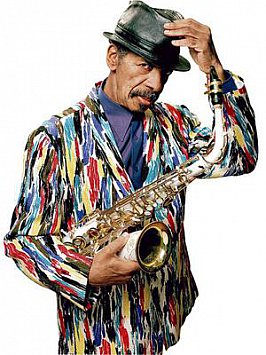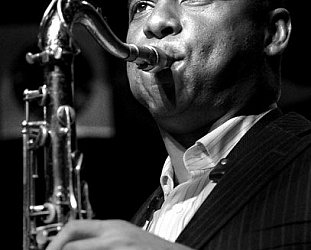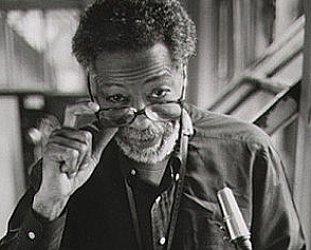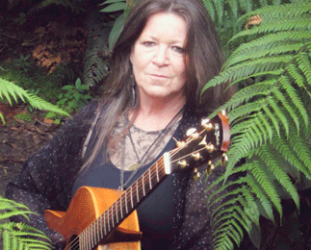Graham Reid | | 3 min read

Few musicians remain creative their whole life. Most fall back on familiar styles or even phrases, others peak early and their career becomes a long and slightly embarrassing re-run of former glories.
Yet Ornette Coleman (born in Fort Worth, Texas, 1930) has not only been restlessly inventive but is widely considered one of the great innovators of the 20th century. Even in the new millennium he continues to confound and create, delight and demand attention.
He did all of those things, especially confound, when I met him in New York a decade ago. Wearing a blue-checked suit, purple waistcoat and a collarless shirt buttoned up to the neck, he was dapper in an idiosyncratic way and sometimes spoke in almost impenetrable riddles. He was amusing, charming, quietly spoken and much smaller than I imagined.
My profile for the New Zealand Herald started: “For a man who has had his lights punched out, was reviled by critics and audiences, often ignored and, in latter years, belatedly recognised as a genius, Ornette Coleman is remarkably slight.”
I also noted however that he somehow seemed much bigger. Genius can be like that.
Coleman is nominally a jazz musician, he prefers to call himself an improvising composer who sometimes uses the instruments of jazz. He plays saxophone, violin and trumpet, but has also played shehnai (an Indian wind instrument with an astringent tone), written for orchestras and created extraordinary film scores, notably for David Croneberg’s Naked Lunch in 1991.
In the 60s he improvised with Yoko Ono, played with the Gunther Schuller Orchestra and avant-garde saxophonist Albert Ayler. In just an 18 month period in the 70s he recorded with the Master Musicians of Joujouka in Morocco, the London Symphony Orchestra, and electric guitarist James Blood Ulmer in New York. The Grateful Dead’s guitarist Jerry Garcia appeared on Coleman’s 1988 album Virgin Beauty.
Coleman is a composer for whom musical boundaries are arbitrary and his self-devised “harmolodic” system for composition is designed to “remove the caste system from sound”.
He influenced Miles Davis, his admirers include the guitarist Pat Metheny and Red Hot Chili Peppers, and musicians from his 60s quartets -- trumpeter Don Cherry, drummer Billy Higgins and bassist Charlie Haden -- all went on to have successful independent careers.
These days Ornette Coleman is as likely to be name-checked by rock bands like Sonic Youth as kids coming out of jazz classes.
As John Litweiler wrote in Ornette Coleman: A Harmolodic Life, “Ornette Coleman, like a benign parent, can survey a large, active jazz scene that he fathered through his persistence and dedication.”
That was written in the early 90s and Coleman’s influence has been even more profound in the decade and a half since. In 2007 he was awarded both a Pulitzer Prize for Music and a Grammy for Lifetime Achievement.
Coleman’s unorthodox music -- whether it be the watershed Free Jazz album of 1960 which ushered in a new way of thinking about music, his symphonic work Skies of America from the early 70s, his “rock band” Prime Time in the 80s, or his compositions for string quartet -- has made listeners and musicians think, frown sometimes and often smile. And his Sound Grammar (2006) was as adventurous as any in his 50 year career.
Ornette Coleman, a genius now in his late 70s, still has the capacity to surprise, delight and influence.
*****
Coda: At a guess I have seen literally thousands of concerts/gigs/shows -- yet none I anticipated as eagerly as seeing Ornette Coleman live. I had missed him by a week in Venice once and when I interviewed him in New York he wasn't playing anywhere. So I went to the Wellington concert at the Michael Fowleer Centre on February 23 2088 with great antication, but also slightly fearful that he might disappoint. After all he was 77.
When he came on stage he looked terrific: a blue suit and white shoes with black uppers. He also seemed taller on stage than in real life and reminded me of a more skinny Morgan Freeman. He had lost quite a bit of hair since the time I met him. However he shuffled on stage with desperately fragile steps.
Yet from the first note he played on a white plastic also it was apparent that he had lost none of his power, tone, confidence and courage. With three bassists -- Charnette Moffet and Al McDowell on electric, Tony Falanga on acoustic which he mostly played arco -- and son Denardo on drums, this was a concert that exceeded my expectations.
For some sections I closed my eyes and it was as if Coleman was playing like a young man. He played with inventiveness and passion, and sometimes wit.
Frankly, the encore of Lonely Woman would have been worth the price of admission alone.
I jokingly said to someone later I could now die happy. Maybe it wasn't such a joke after all. Genius, and I was in its presence. - Feb 24, 2008
This short essay was written for the programme of the Ornette Coleman concert at the International Festival of the Arts, Wellington February 2008







post a comment